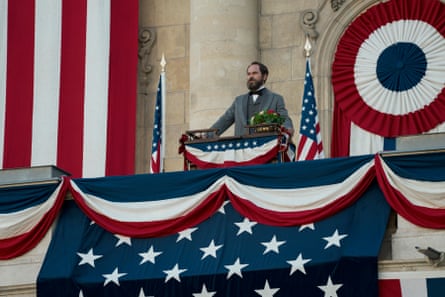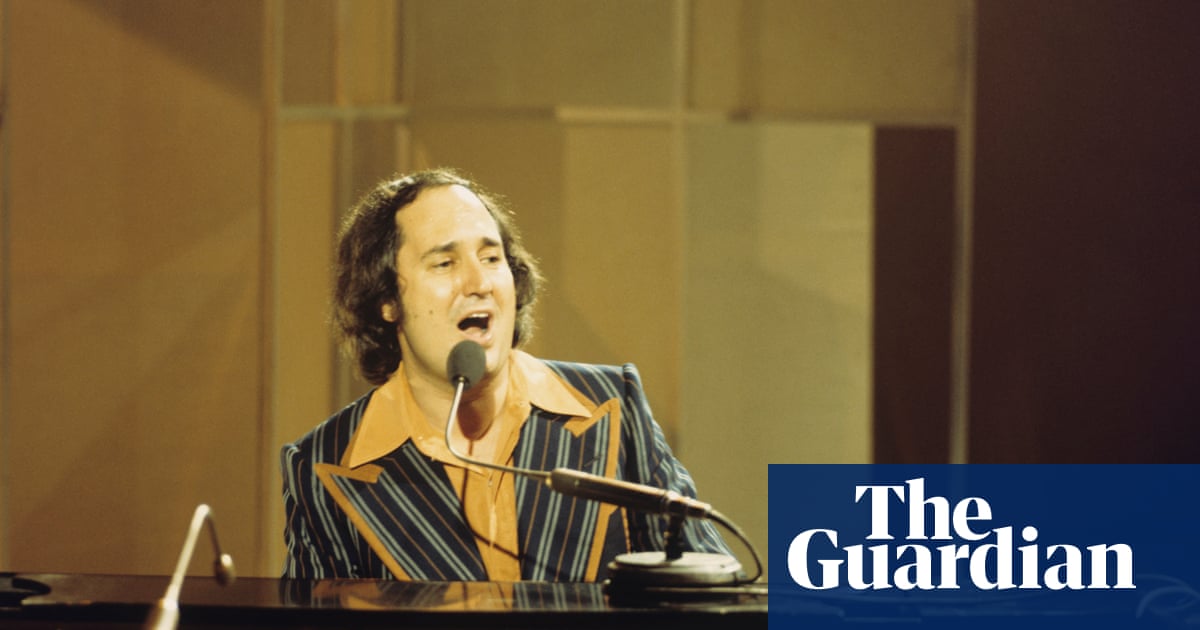“My name,” says Charles Guiteau (Matthew Macfadyen), the anti-hero of punchy four-part historical miniseries Death by Lightning, “will be known one day all across this country!” Guiteau was, until now, wrong. He tried to insert himself into history by assassinating the US president, James Garfield, in 1881 – but Garfield was only four months into his tenure, so all Guiteau did by shooting him was turn them both into difficult pub quiz answers.
Death by Lightning pays careful tribute to Garfield, a quietly extraordinary statesman, but its focus is Guiteau and, if this show is a hit, he might finally get his wish. If so, it’ll be because Charles Guiteau has become a byword for the sort of pitiable crank that Matthew Macfadyen plays better than anyone else on television.
Wild of eye, sporting a beard that is somehow pointy and scraggly, and forever adjusting his old clothes, Guiteau is a “fantasist, a liar and a serial non-payer of bills” … who has no skills or vocation beyond relentless self-promotion. You can almost smell his desperation as he pings from one humiliation to the next: a bank manager instantly refuses him the loan he needs for his ill-conceived plan to found a newspaper; Guiteau’s snooty brother-in-law (Ben Miles) correctly tells his kind wife Franny (Paula Malcomson) that her brother is a parasite who will never repay her faith. Female company eludes him even when he spends five years in a free love commune, because he was too annoying for any of the women to have sex with him.
He is running out of eccentric scams when he happens upon a crowd gathered outside the 1880 Republican party convention in Chicago. As Garfield becomes the Republican nominee and then the 20th president, Guiteau’s greatest and last obsession will be his quest to become Garfield’s trusted acolyte and, perhaps, his friend.
Macfadyen has obviously been cast on the back of his portrayal of greasy climber Tom Wambsgans in Succession, but here he takes his mastery of grasping losers to another level. Wambsgans accepted every Faustian bargain going to achieve wealth and status; Guiteau has not even received the offer. Macfadyen nails everything, from his maniacal joy when he briefly thinks he’s winning, to his strangled guffaw of disbelief when he’s rejected. He’s mostly comic but his one substantial meeting with Garfield, which he spends weeks angling for, is agonisingly tragic, as Guiteau opens up his soul to reveal nothing inside. Macfadyen is brilliant in every awful moment.

The lesser of the series’ parallel narratives stars Michael Shannon as Garfield, who gives a candidate endorsement speech at that 1880 convention that is so rousing, he wins the Republican nomination despite not being on the ballot. By sticking to his principles and convening directly with the electorate – his campaign features him inviting citizens to his front porch for a chat – Garfield becomes president. His programme of progressive reforms horrifies the corrupt Republican elite, who move to protect their financial interests and are willing to burn the party to the ground if it means they can rule over the ashes.
Here is where Death by Lightning has the most fun, with Shea Whigham as cocky, bullying plunderer Roscoe Conkling, and Nick Offerman perfectly cast as Chester Arthur, a violent, vomiting stovepipe of a man who is sworn in as Garfield’s vice-president because of the political necessity of getting the fat-cat New York faction on side. Offerman is terrifically funny when Arthur is a roaring boor (his drunken catchphrase: “Music! Fighting! Sausages!”), then suddenly affectingly vulnerable as we glimpse the man inside the monster. Arthur is the product of a system that preys on people who grow tired of punching up, offering rewards if they sell their principles and punch down instead. Arthur can’t drink enough to blot out this shame.
The show struggles to find a similar narrative for Garfield, who is considered and self-aware to a fault, which doesn’t give Shannon much to chew on. In its desire to get the story done in under four hours, Death by Lightning also resorts to some hasty character transitions and a fair chunk of heavily expositional dialogue, while its female characters are rarely heard above the din of flawed men. Everyone is in Guiteau’s shadow: when he’s not on screen we’re waiting for him to return, to see what horrible self-inflicted defeat he will suffer next.
The last of those is at the gallows, which he sees as an opportunity to stun the gathered crowd with his oratory, one last time. He dies on his arse, then dies. We know the name now, but Macfadyen’s performance is what we’ll really remember.

.png) 3 months ago
86
3 months ago
86

















































